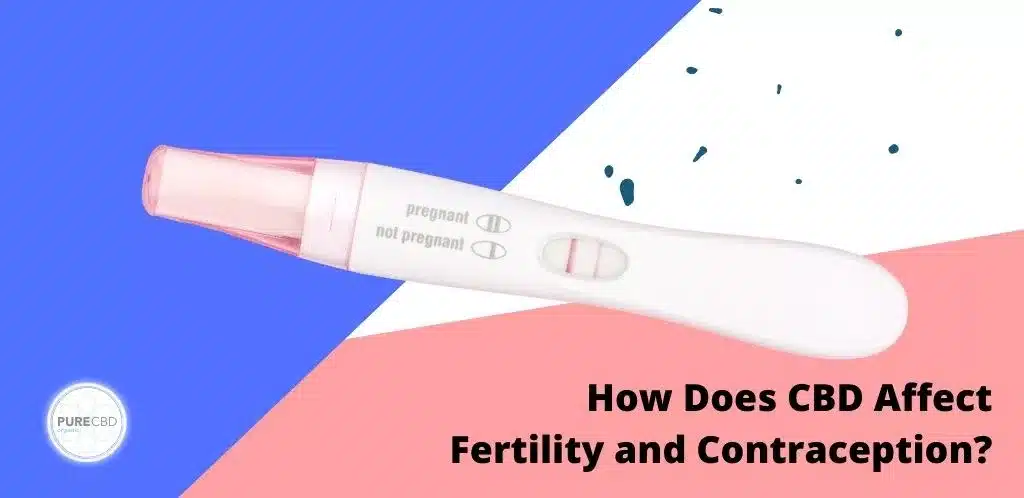No products in the cart.
Return To Shop
How does CBD Affect Fertility and Contraception?
Estradiol is one of three oestrogen hormones produced within the body. Large quantities of cannabidiol (CBD) were found to potentially compete with estradiol for oestrogen receptors found in the female reproductive system. Whilst this sounds very technical, it simply means that CBD could stop this hormone interacting with the body because it gets in the way. If you take contraception which relies on this hormone, then CBD could stop it interacting with the body. If it can’t interact with the body then the contraception might not work properly. This is another way that CBD can potentially prevent oestrogen-based contraceptives from working, increasing the risk of pregnancy.
CBD and Side Effects from Contraception
There is some research to suggest that CBD could cause an exaggeration of side effects of the contraceptive pill. These side effects include blood clots and breast cancer. This is due to the fact that CBD could increase the level of medication in your blood by slowing down their digestion in the liver. This increased level of medication in your blood would cause an increase in side effects. There is currently research taking place to assess how enzyme inhibitors (such as CBD) increase the risk of these side effects.
CBD and Fertility
Lots of research has taken place to establish how cannabis and CBD might affect fertility. When looking at research into marijuana or cannabis it has to be taken into account that these substances are very different to CBD products. They contain high levels of THC as shown by the fact they give you a ‘high’. There is also the potential for them to contain toxins or other substances due to the lack of regulation of these products. The findings are still important and worth considering, especially if you are planning to try and conceive soon.
The ECS is essential for enabling your body to reproduce successfully and research has found that marijuana has the ability to disrupt this system. A study in the Journal of Ovarian Research in 2019 found that high levels of cannabinoids led to reduced sperm count, testosterone levels and reduced ovulation in women. In women, high exposure to cannabinoids was also found to disrupt their periods.
In men, marijuana has been shown to impact fertility. The male reproductive system is also affected by the ECS so CBD has the potential to change how it functions. This 2015 study concluded that cannabis compounds impact male fertility at “multiple levels”. These included reducing sperm count due to affecting cannabinoid receptors and also potentially causing erectile problems.
CBD and Pregnancy
If you are pregnant it is very important that you speak to your doctor before taking any CBD products. A 2016 study found that changes in the ECS caused by very high exposure to cannabinoids could lead to ectopic pregnancy or miscarriage.
You would be unlikely to expose yourself to very high levels of cannabinoids when taking CBD but it is important to get the advice of your doctor. We advise against taking CBD when pregnant or breastfeeding.
How does this affect me?
This may all seem slightly confusing and overwhelming at first. However, all of these studies look at cases where high quantities of CBD are being taken. If you only take a few drops of a low percentage CBD product then you are at a lower risk of CBD affecting your contraception or fertility. If you are currently taking oestrogen-based contraception and CBD, you may want to consider using additional methods to protect against pregnancy such as condoms. It is also important to consult with your doctor just as when taking any other prescription medication. If you are trying to get pregnant it is important to consult with your doctor before taking CBD. This applies to men and women as the male reproductive system is also influenced by the ECS.
Future Research
Currently, a very important study is taking place run by the University of Oregon. In this study they are testing how CBD interacts with the contraceptive pill in women aged 18-35. The results of this research will be significant in understanding whether CBD can stop contraception from working. The results from this trial are expected in summer 2022. We will update you as soon as any findings are published.
Summarising the effects of CBD on Fertility and Contraception
The main conclusion is that high quantities of CBD have the potential to impact both fertility and contraception. These findings are not conclusive and shouldn’t cause you to panic if you currently take CBD. The best thing to do is to contact your doctor and they will be able to help work out what’s best for you.
Because CBD interacts with the Endocannabinoid System (ECS) which is closely linked to reproduction, it can change how hormones are produced and interact with the body. This impacts both hormonal contraception and fertility.
CBD is broken down in the liver before interacting with the ECS. This could potentially reduce the liver’s ability to process other medications. This is significant for people who take hormonal contraceptive pills because they are broken down in the liver. Slowing down this process could make the pill less effective and increase the levels of medication in the blood. This may increase the risk of side effects from the pill.
Additionally, the delicate balance of fertility can be disrupted by consuming high levels of cannabinoids. Whilst research is still ongoing it is apparent that anyone trying to conceive should talk with their doctor about taking CBD due to its potential to influence ovulation and sperm count.
Millions of people around the world safely enjoy the benefits of CBD and future research will help to clarify how CBD and prescription medications can be taken together.
We would love to hear your thoughts and opinions on this blog. If you have any questions please don’t hesitate to get in touch with us.
How does CBD work?
CBD interacts with your body through the Endocannabinoid System (ECS). The ECS is essential for your body’s natural functioning and helps all the different processes in your body work together. It controls lots of different things such as mood, appetite, inflammation and sleep patterns. It also impacts the level of hormones in your body as it interacts with receptors which control the thyroid and pituitary glands. CBD can help to restore balance to the ECS and assist with its proper functioning.
CBD and Liver Interaction
In the same way as many other medications, CBD is broken down in the liver. It is broken down by the liver enzyme called Cytochrome P450 (CYP450). This enzyme is responsible for breaking down more than sixty percent of medications. If you take large amounts of CBD this will slow down these enzymes and could affect medications that you are taking. You may have heard that some medications should not be taken alongside grapefruit and that is because of a similar interaction with the liver. However, high quantities of CBD are likely to have a more significant impact than grapefruit. If your doctor tells you to avoid grapefruit with your medication then it’s likely that CBD could affect it too.

CBD and Hormonal Contraception
Millions of people around the world rely on hormonal contraception to prevent pregnancy and manage their reproductive cycles. There is evidence to suggest that CBD’s interaction with the liver may impact how hormonal contraception works, especially when it comes to oestrogen-based contraception. There are two potential consequences of how CBD interacts with oestrogen-based contraception. First, CBD may prevent the contraception from working effectively as it cannot be broken down in the liver. Secondly, as the contraception is broken down slowly, high levels may remain in the blood increasing side effects.
How CBD can reduce the effectiveness of oestrogen-based contraception
The CYP450 enzyme that was mentioned earlier is crucial for explaining how CBD can impact the effectiveness of oestrogen-based contraception. As CBD can stop or slow this enzyme working this may increase breakthrough bleeding and reduce the effectiveness of the contraception. This study found that CBD can possibly block the CYP540 enzyme to the extent that the pill stops being effective. However, at the moment scientists are not sure of the amount of CBD that would need to be taken in order to have this effect. There is also evidence that suggests that staggering the time contraception and CBD is taken could reduce the risk of this happening as it will give contraception time to pass through the liver.
CBD and Estradiol
Estradiol is one of three oestrogen hormones produced within the body. Large quantities of cannabidiol (CBD) were found to potentially compete with estradiol for oestrogen receptors found in the female reproductive system. Whilst this sounds very technical, it simply means that CBD could stop this hormone interacting with the body because it gets in the way. If you take contraception which relies on this hormone, then CBD could stop it interacting with the body. If it can’t interact with the body then the contraception might not work properly. This is another way that CBD can potentially prevent oestrogen-based contraceptives from working, increasing the risk of pregnancy.
[/vc_column_text][/vc_column][/vc_row]
CBD and Side Effects from Contraception
There is some research to suggest that CBD could cause an exaggeration of side effects of the contraceptive pill. These side effects include blood clots and breast cancer. This is due to the fact that CBD could increase the level of medication in your blood by slowing down their digestion in the liver. This increased level of medication in your blood would cause an increase in side effects. There is currently research taking place to assess how enzyme inhibitors (such as CBD) increase the risk of these side effects.
CBD and Fertility
Lots of research has taken place to establish how cannabis and CBD might affect fertility. When looking at research into marijuana or cannabis it has to be taken into account that these substances are very different to CBD products. They contain high levels of THC as shown by the fact they give you a ‘high’. There is also the potential for them to contain toxins or other substances due to the lack of regulation of these products. The findings are still important and worth considering, especially if you are planning to try and conceive soon.
The ECS is essential for enabling your body to reproduce successfully and research has found that marijuana has the ability to disrupt this system. A study in the Journal of Ovarian Research in 2019 found that high levels of cannabinoids led to reduced sperm count, testosterone levels and reduced ovulation in women. In women, high exposure to cannabinoids was also found to disrupt their periods.
In men, marijuana has been shown to impact fertility. The male reproductive system is also affected by the ECS so CBD has the potential to change how it functions. This 2015 study concluded that cannabis compounds impact male fertility at “multiple levels”. These included reducing sperm count due to affecting cannabinoid receptors and also potentially causing erectile problems.
CBD and Pregnancy
If you are pregnant it is very important that you speak to your doctor before taking any CBD products. A 2016 study found that changes in the ECS caused by very high exposure to cannabinoids could lead to ectopic pregnancy or miscarriage.
You would be unlikely to expose yourself to very high levels of cannabinoids when taking CBD but it is important to get the advice of your doctor. We advise against taking CBD when pregnant or breastfeeding.
How does this affect me?
This may all seem slightly confusing and overwhelming at first. However, all of these studies look at cases where high quantities of CBD are being taken. If you only take a few drops of a low percentage CBD product then you are at a lower risk of CBD affecting your contraception or fertility. If you are currently taking oestrogen-based contraception and CBD, you may want to consider using additional methods to protect against pregnancy such as condoms. It is also important to consult with your doctor just as when taking any other prescription medication. If you are trying to get pregnant it is important to consult with your doctor before taking CBD. This applies to men and women as the male reproductive system is also influenced by the ECS.
Future Research
Currently, a very important study is taking place run by the University of Oregon. In this study they are testing how CBD interacts with the contraceptive pill in women aged 18-35. The results of this research will be significant in understanding whether CBD can stop contraception from working. The results from this trial are expected in summer 2022. We will update you as soon as any findings are published.
Summarising the effects of CBD on Fertility and Contraception
The main conclusion is that high quantities of CBD have the potential to impact both fertility and contraception. These findings are not conclusive and shouldn’t cause you to panic if you currently take CBD. The best thing to do is to contact your doctor and they will be able to help work out what’s best for you.
Because CBD interacts with the Endocannabinoid System (ECS) which is closely linked to reproduction, it can change how hormones are produced and interact with the body. This impacts both hormonal contraception and fertility.
CBD is broken down in the liver before interacting with the ECS. This could potentially reduce the liver’s ability to process other medications. This is significant for people who take hormonal contraceptive pills because they are broken down in the liver. Slowing down this process could make the pill less effective and increase the levels of medication in the blood. This may increase the risk of side effects from the pill.
Additionally, the delicate balance of fertility can be disrupted by consuming high levels of cannabinoids. Whilst research is still ongoing it is apparent that anyone trying to conceive should talk with their doctor about taking CBD due to its potential to influence ovulation and sperm count.
Millions of people around the world safely enjoy the benefits of CBD and future research will help to clarify how CBD and prescription medications can be taken together.
We would love to hear your thoughts and opinions on this blog. If you have any questions please don’t hesitate to get in touch with us.
What is CBD?
CBD or Cannabidiol, is a cannabinoid which means that it comes from the cannabis plant. There are over a hundred different cannabinoids with different uses and effects. CBD is becoming increasingly popular because people are reporting lots of benefits of taking it. CBD is legal in the UK and most European countries as long as it contains less than 0.2% THC.
How does CBD work?
CBD interacts with your body through the Endocannabinoid System (ECS). The ECS is essential for your body’s natural functioning and helps all the different processes in your body work together. It controls lots of different things such as mood, appetite, inflammation and sleep patterns. It also impacts the level of hormones in your body as it interacts with receptors which control the thyroid and pituitary glands. CBD can help to restore balance to the ECS and assist with its proper functioning.
CBD and Liver Interaction
In the same way as many other medications, CBD is broken down in the liver. It is broken down by the liver enzyme called Cytochrome P450 (CYP450). This enzyme is responsible for breaking down more than sixty percent of medications. If you take large amounts of CBD this will slow down these enzymes and could affect medications that you are taking. You may have heard that some medications should not be taken alongside grapefruit and that is because of a similar interaction with the liver. However, high quantities of CBD are likely to have a more significant impact than grapefruit. If your doctor tells you to avoid grapefruit with your medication then it’s likely that CBD could affect it too.

CBD and Hormonal Contraception
Millions of people around the world rely on hormonal contraception to prevent pregnancy and manage their reproductive cycles. There is evidence to suggest that CBD’s interaction with the liver may impact how hormonal contraception works, especially when it comes to oestrogen-based contraception. There are two potential consequences of how CBD interacts with oestrogen-based contraception. First, CBD may prevent the contraception from working effectively as it cannot be broken down in the liver. Secondly, as the contraception is broken down slowly, high levels may remain in the blood increasing side effects.
How CBD can reduce the effectiveness of oestrogen-based contraception
The CYP450 enzyme that was mentioned earlier is crucial for explaining how CBD can impact the effectiveness of oestrogen-based contraception. As CBD can stop or slow this enzyme working this may increase breakthrough bleeding and reduce the effectiveness of the contraception. This study found that CBD can possibly block the CYP540 enzyme to the extent that the pill stops being effective. However, at the moment scientists are not sure of the amount of CBD that would need to be taken in order to have this effect. There is also evidence that suggests that staggering the time contraception and CBD is taken could reduce the risk of this happening as it will give contraception time to pass through the liver.
CBD and Estradiol
Estradiol is one of three oestrogen hormones produced within the body. Large quantities of cannabidiol (CBD) were found to potentially compete with estradiol for oestrogen receptors found in the female reproductive system. Whilst this sounds very technical, it simply means that CBD could stop this hormone interacting with the body because it gets in the way. If you take contraception which relies on this hormone, then CBD could stop it interacting with the body. If it can’t interact with the body then the contraception might not work properly. This is another way that CBD can potentially prevent oestrogen-based contraceptives from working, increasing the risk of pregnancy.
[/vc_column_text][/vc_column][/vc_row]
CBD and Side Effects from Contraception
There is some research to suggest that CBD could cause an exaggeration of side effects of the contraceptive pill. These side effects include blood clots and breast cancer. This is due to the fact that CBD could increase the level of medication in your blood by slowing down their digestion in the liver. This increased level of medication in your blood would cause an increase in side effects. There is currently research taking place to assess how enzyme inhibitors (such as CBD) increase the risk of these side effects.
CBD and Fertility
Lots of research has taken place to establish how cannabis and CBD might affect fertility. When looking at research into marijuana or cannabis it has to be taken into account that these substances are very different to CBD products. They contain high levels of THC as shown by the fact they give you a ‘high’. There is also the potential for them to contain toxins or other substances due to the lack of regulation of these products. The findings are still important and worth considering, especially if you are planning to try and conceive soon.
The ECS is essential for enabling your body to reproduce successfully and research has found that marijuana has the ability to disrupt this system. A study in the Journal of Ovarian Research in 2019 found that high levels of cannabinoids led to reduced sperm count, testosterone levels and reduced ovulation in women. In women, high exposure to cannabinoids was also found to disrupt their periods.
In men, marijuana has been shown to impact fertility. The male reproductive system is also affected by the ECS so CBD has the potential to change how it functions. This 2015 study concluded that cannabis compounds impact male fertility at “multiple levels”. These included reducing sperm count due to affecting cannabinoid receptors and also potentially causing erectile problems.
CBD and Pregnancy
If you are pregnant it is very important that you speak to your doctor before taking any CBD products. A 2016 study found that changes in the ECS caused by very high exposure to cannabinoids could lead to ectopic pregnancy or miscarriage.
You would be unlikely to expose yourself to very high levels of cannabinoids when taking CBD but it is important to get the advice of your doctor. We advise against taking CBD when pregnant or breastfeeding.
How does this affect me?
This may all seem slightly confusing and overwhelming at first. However, all of these studies look at cases where high quantities of CBD are being taken. If you only take a few drops of a low percentage CBD product then you are at a lower risk of CBD affecting your contraception or fertility. If you are currently taking oestrogen-based contraception and CBD, you may want to consider using additional methods to protect against pregnancy such as condoms. It is also important to consult with your doctor just as when taking any other prescription medication. If you are trying to get pregnant it is important to consult with your doctor before taking CBD. This applies to men and women as the male reproductive system is also influenced by the ECS.
Future Research
Currently, a very important study is taking place run by the University of Oregon. In this study they are testing how CBD interacts with the contraceptive pill in women aged 18-35. The results of this research will be significant in understanding whether CBD can stop contraception from working. The results from this trial are expected in summer 2022. We will update you as soon as any findings are published.
Summarising the effects of CBD on Fertility and Contraception
The main conclusion is that high quantities of CBD have the potential to impact both fertility and contraception. These findings are not conclusive and shouldn’t cause you to panic if you currently take CBD. The best thing to do is to contact your doctor and they will be able to help work out what’s best for you.
Because CBD interacts with the Endocannabinoid System (ECS) which is closely linked to reproduction, it can change how hormones are produced and interact with the body. This impacts both hormonal contraception and fertility.
CBD is broken down in the liver before interacting with the ECS. This could potentially reduce the liver’s ability to process other medications. This is significant for people who take hormonal contraceptive pills because they are broken down in the liver. Slowing down this process could make the pill less effective and increase the levels of medication in the blood. This may increase the risk of side effects from the pill.
Additionally, the delicate balance of fertility can be disrupted by consuming high levels of cannabinoids. Whilst research is still ongoing it is apparent that anyone trying to conceive should talk with their doctor about taking CBD due to its potential to influence ovulation and sperm count.
Millions of people around the world safely enjoy the benefits of CBD and future research will help to clarify how CBD and prescription medications can be taken together.
We would love to hear your thoughts and opinions on this blog. If you have any questions please don’t hesitate to get in touch with us.












